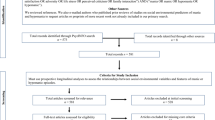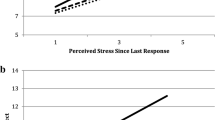Abstract
This study tested the association of cognitive vulnerability based on sociotropy—autonomy and congruent negative life events, with onset and severity of symptoms in bipolar patients over a longitudinal course. Forty-nine remitted bipolar patients were followed for an average of 18 months. Onset of symptoms was not associated with a preponderance of stressors that matched the individual's sociotropic—autonomous type. However, symptom severity was significantly associated with sociotropy, interpersonal events, and the interaction of the two—but no such associations were found with autonomy or autonomy/achievement events. Results were discussed in terms of differences between unipolar and bipolar patients' mechanisms for symptom onset, and the role of sociotropy and interpersonal events in symptom experience and expression.
Similar content being viewed by others
References
Arieti, S., & Bemporad, J. (1980). The psychological organization of depression.American Journal of Psychiatry, 137, 1360–1365.
Barnett, P., & Gotlib, I. (1988). Psychosocial functioning and depression: Distinguishing among antecedents, concomitants, and consequences.Psychological Bulletin, 104, 97–126.
Beck, A. T. (1982). Cognitive therapy of depression: New perspectives. In P. Clayton & J. Barrett (Eds.),Treatment of depression: Old controversies and new approaches (pp. 265–290). New York: Raven Press.
Beck, A. T., Epstein, N., Harrison, R., & Emery, G. (1983),Development of the Sociotropy—Autonomy Scale: A measure of personality factors in psychopathology. Unpublished manuscript, University of Pennsylvania, Philadelphia.
Bidzinska, E. (1984). Stress factors in affective diseases.British Journal of Psychiatry, 144 161–166.
Blatt, S., Quinlan, D., Chevron, E., McDonald, C., & Zuroff, D. (1982). Dependency and self-criticism: Psychological dimensions for depression.Journal of Consulting and Clinical Psychology, 50, 113–124.
Brown, G., & Harris, T. (1978).Social origins of depression: A study of psychiatric disorders in women. New York: Free Press.
Downey, G., & Coyne, J. (1990). Children of depressed parents: An integrative review.Psychological Bulletin, 108, 50–76.
Ellicott, A., Hammen, C., Gitlin, M., Brown, G., & Jamison, K. R. (1990). Life events and course of bipolar disorder.American Journal of Psychiatry, 147, 1194–1198.
Glassner, B., & Haldipur, C. V. (1983). Life events and early and late onset of bipolar disorder.American Journal of Psychiatry, 140, 215–217.
Goodwin, F., & Jamison, K. (1990).Manic-depressive illness. New York Oxford University Press.
Hammen, C. (1991).Depression runs in families: The social context of risk and resilience in children of depressed mothers. New York: Springer-Verlag.
Hammen, C., Ellicott, A., & Gitlin, M. (1989a). Vulnerability to specific life events and prediction of course of disorder in unipolar depressed patients.Canadian Journal of Behavioral Science 21, 377–388.
Hammen, C., Ellicott, A., Gitlin, M., & Jamison, K. R. (1989b). Sociotropy/autonomy and vulnerability to specific life events in patents with unipolar depression and bipolar disorders.Journal of Abnormal Psychology, 98, 154–160.
Hammen, C., & Goodman-Brown, T. (1990). Self-schemas and vulnerability to specific life stress in children at risk for depression.Cognitive Therapy and Research, 14, 215–227.
Hammen, C., Marks, T., Mayol, A., & deMayo, R. (1985). Depressive self-schemas, life stress, and vulnerability to depression.Journal of Abnormal Psychology, 94, 308–319.
Kennedy, S., Thompson, R., Stancer, H. C., Roy, A., & Persad, E. (1983). Life events precipitating mania.British Journal of Psychiatry, 142, 398–403.
Paykel, E. S., (1979). Recent life events in the development of the depressive disorders. In R. A. Depue (Ed.),The psychobiology of the depressive disorders: Implications for the effectsof stress (pp. 245–262). New York: Academic Press.
Robins, C. (1990). Congruence of personality and life events in depression.Journal of Abnormal Psychology, 99, 393–397.
Robins, C. J., & Block, P. (1988). Personal vulnerability, life events, and depressive symptoms: A test of a specific interactional model.Journal of Personality and Social Psychology, 54, 847–852.
Robins, C., & Luten, A. (1991). Sociotropy and autonomy: Differential patterns of clinical presentation in unipolar depression.Journal of Abnormal Psychology, 100, 74–77.
Robins, C., Block, P., & Peselow, E. (1989). Relations of sociotropic and autonomous personality characteristics to specific symptoms in depressed patients.Journal of Abnormal Psychology, 98, 86–88.
Author information
Authors and Affiliations
Additional information
The authors are grateful for the assistance of interviewers Joanne Davila, Gary Brown, Ron Duran, and others who have contributed to this project over the years.
Rights and permissions
About this article
Cite this article
Hammen, C., Ellicott, A. & Gitlin, M. Stressors and sociotropy/autonomy: A longitudinal study of their relationship to the course of bipolar disorder. Cogn Ther Res 16, 409–418 (1992). https://doi.org/10.1007/BF01183165
Issue Date:
DOI: https://doi.org/10.1007/BF01183165




